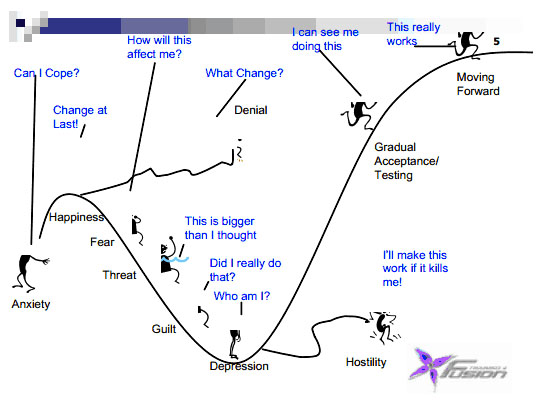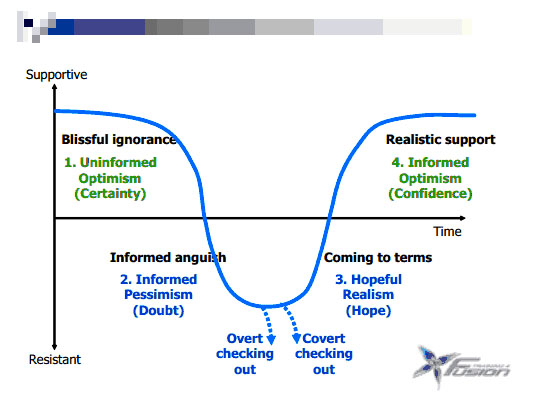Change in business, like life, is unavoidable. Sometimes change is planned, sometimes it comes about as a result of factors we cannot control. Ultimately, the goal of change is to improve the organisation by altering how work is done. Alarmingly, however, current estimates from UK businesses suggest that over 50% of Change Management projects fail.
Ask ten people to define the word “change” and you’ll get twenty answers. To keep it simple, let’s define change as moving from one state of being to another. Sadly the facts suggest that UK businesses struggle to manage change well. It could be moving to a new software system, it could be organisational restructuring, it could be a change to business processes, but whatever the change is, how successfully we deal with change is within our power.
The Facts of Change
Current estimates from UK businesses suggest that over 50% of Change Management projects fail
Research shows mismanagement of change is costing UK companies around £52 billion a year
UK businesses undertake at least three major change projects a year
80% of Managers surveyed said companies fail to keep workers on side during the process and cannot handle resistance to change.
Resistance to Change
It is human nature to resist change. Accepting that this is a normal reaction is the first step to dealing with resistance to change. Understanding the reasons why we resist change can help manage change better.
- Why do we resist change:
- Misunderstand purpose, mechanics or consequence of change
- Fail to see need for change
- Lack of perceived benefits or trust
- Fear of the unknown/loss of status, power etc
- Lack of involvement with change
- Vested interest in status quo
The majority of these reasons for resistance are easily addressed through clear and open communications and by involving all individuals who will be affected in the process. Ongoing communication alleviates the fear of the unknown and makes clear the reasons for change.
- How to deal with resistance to change:
- Accept it as normal
- Do regular one to one and group meetings
- Provide feedback
- Be objective
- Be honest and open – communicate
- Aim to understand issues
- Give people breathing space to accept issues
Managing Reactions to Change
Individuals’ feelings and reactions naturally change throughout the process as they make sense of how the change will affect them and they learn to adapt to the new status quo.

It is important to communicate continually throughout the process, and to recognize the different stages individuals are going through.
| Anxiety |
Allow and accept the response
Acknowledge feelings
Talk through issues and fears |
| Happiness |
Manage unrealistic expectations
Prepare people for setbacks |
| Fear/Threat/Guilt |
Encourage and support people to try out the change |
| Depression |
Be supportive, provide resources, communicate and praise |
| Testing/Acceptance |
Explore realistic options, set short term objectives, help re-establish |
| Acceptance |
Acknowledge progress, plan for future |
As people begin to reach the stage of testing and acceptance, they will do so in different ways; some in a positive light and some in a more pessimistic light. Acceptance isn’t the end of the process, it still needs managing.

Managing people through the stages
| Uninformed Optimism |
Reinforce enthusiasm, prepare for setbacks |
| Informed Pessimism |
Legitimise negative feelings, support |
| Public Withdrawal |
Develop a problem solving climate |
| Private Withdrawal |
Explore feelings and expectations in safe environment |
| Hopeful Realism |
Build confidence – acknowledge accomplishments |
| Informed Optimism |
Reinforce competence build action plans |
| Completion |
Reward achievement, move on. |
It can be just a challenging for the manager to cope with the change, as well as managing their team through the change. It is important to remember the reasons for the change and keep in mind the benefits.
Coping with change top tips:
- Recognise your emotions and stage of reaction
- Apply worst case thinking – allow your imagination to go overboard as you shut your eyes and imagine the worst outcome for the change scenario. When you open your eyes the initial scenario probably won’t seem as bad
- Think in 3’s. We tend to consider 2 courses of action – either or! By considering a 3rd option it opens up opportunities
- Picture success – imagine the change has happened successfully – how do you feel? What did you do – what learning can you bring back to the now?
‘There is nothing permanent except change’. Heraclitus
|






